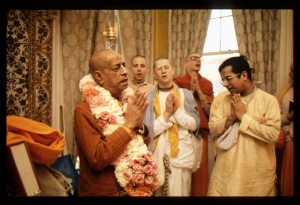CC Madhya 20.180: Difference between revisions
m (1 revision(s)) |
No edit summary |
||
| Line 1: | Line 1: | ||
{{ | [[Category:Sri Caitanya-caritamrta - Madhya-lila Chapter 20|C180]] | ||
<div style="float:left">'''[[Sri Caitanya-caritamrta|Śrī Caitanya-caritāmṛta]] - [[CC Madhya|Madhya-līlā]] - [[CC Madhya 20|Chapter 20: Lord Śrī Caitanya Mahāprabhu Instructs Sanātana Gosvāmī in the Science of the Absolute Truth]]'''</div> | |||
<div style="float:right">[[File:Go-previous.png|link=CC Madhya 20.179|Madhya-līlā 20.179]] '''[[CC Madhya 20.179|Madhya-līlā 20.179]] - [[CC Madhya 20.181|Madhya-līlā 20.181]]''' [[File:Go-next.png|link=CC Madhya 20.181|Madhya-līlā 20.181]]</div> | |||
{{CompareVersions|CC|Madhya 20.180|CC 1975|CC 1996}} | |||
{{RandomImage}} | |||
==== TEXT 180 ==== | ==== TEXT 180 ==== | ||
<div | <div class="verse"> | ||
udgīrṇādbhuta-mādhurī-parimalasyābhīra-līlasya me | :udgīrṇādbhuta-mādhurī-parimalasyābhīra-līlasya me | ||
dvaitaṁ hanta samīkṣayan muhur asau citrīyate cāraṇaḥ | :dvaitaṁ hanta samīkṣayan muhur asau citrīyate cāraṇaḥ | ||
cetaḥ keli-kutūhalottaralitaṁ satyaṁ sakhe māmakaṁ | :cetaḥ keli-kutūhalottaralitaṁ satyaṁ sakhe māmakaṁ | ||
yasya prekṣya svarūpatāṁ vraja-vadhū-sārūpyam anvicchati | :yasya prekṣya svarūpatāṁ vraja-vadhū-sārūpyam anvicchati | ||
</div> | </div> | ||
| Line 14: | Line 18: | ||
==== SYNONYMS ==== | ==== SYNONYMS ==== | ||
<div | <div class="synonyms"> | ||
''udgīrṇa''—overflowing; ''adbhuta''—wonderful; ''mādhurī''—sweetness; ''parimalasya''—whose fragrance; ''ābhīra''—of a cowherd boy; ''līlasya''—who has pastimes; ''me''—My; ''dvaitam''—second form; ''hanta''—alas; ''samīkṣayan''—showing; ''muhuḥ''—again and again; ''asau''—that; ''citrīyate''—is acting like a picture; ''cāraṇaḥ''—dramatic actor; ''cetaḥ''—heart; ''keli-kutūhala''—by longing for pastimes; ''uttaralitam''—greatly excited; ''satyam''—actually; ''sakhe''—O dear friend; ''māmakam''—My; ''yasya''—of whom; ''prekṣya''—by seeing; ''svarūpatām''—similarity to My form; ''vraja-vadhū''—of the damsels of Vrajabhūmi; ''sārūpyam''—a form like the forms; ''anvicchati''—desires. | |||
</div> | </div> | ||
| Line 21: | Line 25: | ||
==== TRANSLATION ==== | ==== TRANSLATION ==== | ||
<div | <div class="translation"> | ||
“‘My dear friend, this dramatic actor appears like a second form of My own self. Like a picture, He displays My pastimes as a cowherd boy overflowing with wonderfully attractive sweetness and fragrance, which are so dear to the damsels of Vraja. When I see such a display, My heart becomes greatly excited. I long for such pastimes and desire a form exactly like that of the damsels of Vraja.’ | “‘My dear friend, this dramatic actor appears like a second form of My own self. Like a picture, He displays My pastimes as a cowherd boy overflowing with wonderfully attractive sweetness and fragrance, which are so dear to the damsels of Vraja. When I see such a display, My heart becomes greatly excited. I long for such pastimes and desire a form exactly like that of the damsels of Vraja.’ | ||
</div> | </div> | ||
| Line 28: | Line 32: | ||
==== PURPORT ==== | ==== PURPORT ==== | ||
<div | <div class="purport"> | ||
This verse is found in the Lalita-mādhava (4.19). It was spoken by Vāsudeva in Dvārakā. | This verse is found in the ''Lalita-mādhava'' (4.19). It was spoken by Vāsudeva in Dvārakā. | ||
</div> | </div> | ||
__NOTOC__ | |||
<div style="float:right; clear:both;">[[File:Go-previous.png|link=CC Madhya 20.179|Madhya-līlā 20.179]] '''[[CC Madhya 20.179|Madhya-līlā 20.179]] - [[CC Madhya 20.181|Madhya-līlā 20.181]]''' [[File:Go-next.png|link=CC Madhya 20.181|Madhya-līlā 20.181]]</div> | |||
__NOTOC__ | |||
__NOEDITSECTION__ | |||
Revision as of 03:32, 7 September 2021

A.C. Bhaktivedanta Swami Prabhupada
TEXT 180
- udgīrṇādbhuta-mādhurī-parimalasyābhīra-līlasya me
- dvaitaṁ hanta samīkṣayan muhur asau citrīyate cāraṇaḥ
- cetaḥ keli-kutūhalottaralitaṁ satyaṁ sakhe māmakaṁ
- yasya prekṣya svarūpatāṁ vraja-vadhū-sārūpyam anvicchati
SYNONYMS
udgīrṇa—overflowing; adbhuta—wonderful; mādhurī—sweetness; parimalasya—whose fragrance; ābhīra—of a cowherd boy; līlasya—who has pastimes; me—My; dvaitam—second form; hanta—alas; samīkṣayan—showing; muhuḥ—again and again; asau—that; citrīyate—is acting like a picture; cāraṇaḥ—dramatic actor; cetaḥ—heart; keli-kutūhala—by longing for pastimes; uttaralitam—greatly excited; satyam—actually; sakhe—O dear friend; māmakam—My; yasya—of whom; prekṣya—by seeing; svarūpatām—similarity to My form; vraja-vadhū—of the damsels of Vrajabhūmi; sārūpyam—a form like the forms; anvicchati—desires.
TRANSLATION
“‘My dear friend, this dramatic actor appears like a second form of My own self. Like a picture, He displays My pastimes as a cowherd boy overflowing with wonderfully attractive sweetness and fragrance, which are so dear to the damsels of Vraja. When I see such a display, My heart becomes greatly excited. I long for such pastimes and desire a form exactly like that of the damsels of Vraja.’
PURPORT
This verse is found in the Lalita-mādhava (4.19). It was spoken by Vāsudeva in Dvārakā.